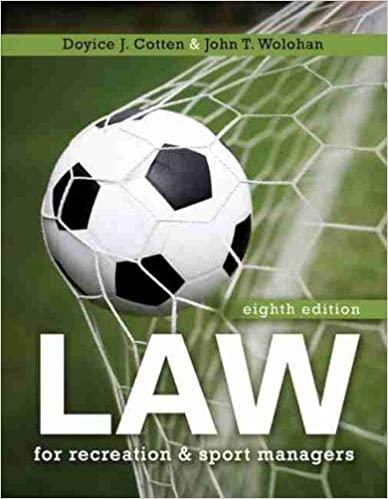Question
We all know that words that we put in Google's search box is not kept secret. But how are those information handled, and shall they
We all know that words that we put in Google's search box is not kept secret. But how are those information handled, and shall they deserve certain privacy? Please read the following case and answer questions.
In 1998, Congress enacted the Child Online Protection Act ("COPA"), which is now codified as 47 U.S.C. 231. COPA prohibits the knowing making of a communication by means of the World Wide Web, "for commercial purposes that is available to any minor and that includes material that is harmful to minors," subject to certain affirmative defenses. The Government initiated a study designed to somehow test the effectiveness of blocking and filtering software.
To provide it with data for its study, the Government served a subpoena on Google, America Online, Inc. ("AOL"), Yahoo! Inc. ("Yahoo"), and Microsoft, Inc. ("Microsoft"). The subpoena required that these companies produce a designated listing of the URLs which would be available to a user of their services. The subpoena also required the companies to produce the text of users' search queries. AOL, Yahoo, and Microsoft appear to be producing data pursuant to the Government's request. Google, however, objected. Google is a Delaware corporation headquartered in Mountain View, CA, that, like AOL, Yahoo, and Microsoft, also provides search engine capabilities. Based on the Government's estimation, and uncontested by Google, Google's search engine is the most widely used search engine in the world, with a market share of about 45%. The search engine at Google yields URLs in response to a search query entered by a user. The search queries entered may be of varying lengths, and incorporate a number of terms and connectors. Upon receiving a search query, Google produces a responsive list of URLs from its search index in a particular order based on algorithms proprietary to Google. Following negotiations with Google, the Government restricted the scope of its request, and the Government now seeks only 50,000 URLs from Google's search index and 5,000 entries from Google's query log. Despite these modifications in the scope of the subpoena, Google maintained its objection to the Government's requests. Before the Court is a motion to compel Google to comply with the modified subpoena, namely, for a sample of 50,000 URLs from Google's search index (GRANTED) and 5,000 search queries entered by Google's users (DENIED) from Google's query log.
Question 1: Search through Google's user agreement, and find out what user private information is protected, what is not. Is a user's searching history being protected?
Question 2: What is your standing in this case, in other words, do you think Google should provide user's searching history to the government? Does your standing depends on the nature of case, for example, if it is not the government, but a private company makes such request, while doing the say research, will you change your mind?
Step by Step Solution
There are 3 Steps involved in it
Step: 1

Get Instant Access to Expert-Tailored Solutions
See step-by-step solutions with expert insights and AI powered tools for academic success
Step: 2

Step: 3

Ace Your Homework with AI
Get the answers you need in no time with our AI-driven, step-by-step assistance
Get Started


